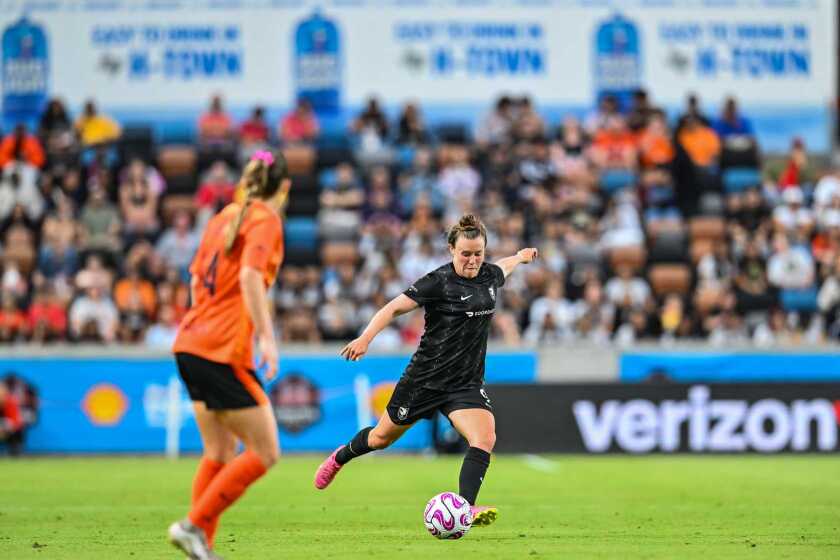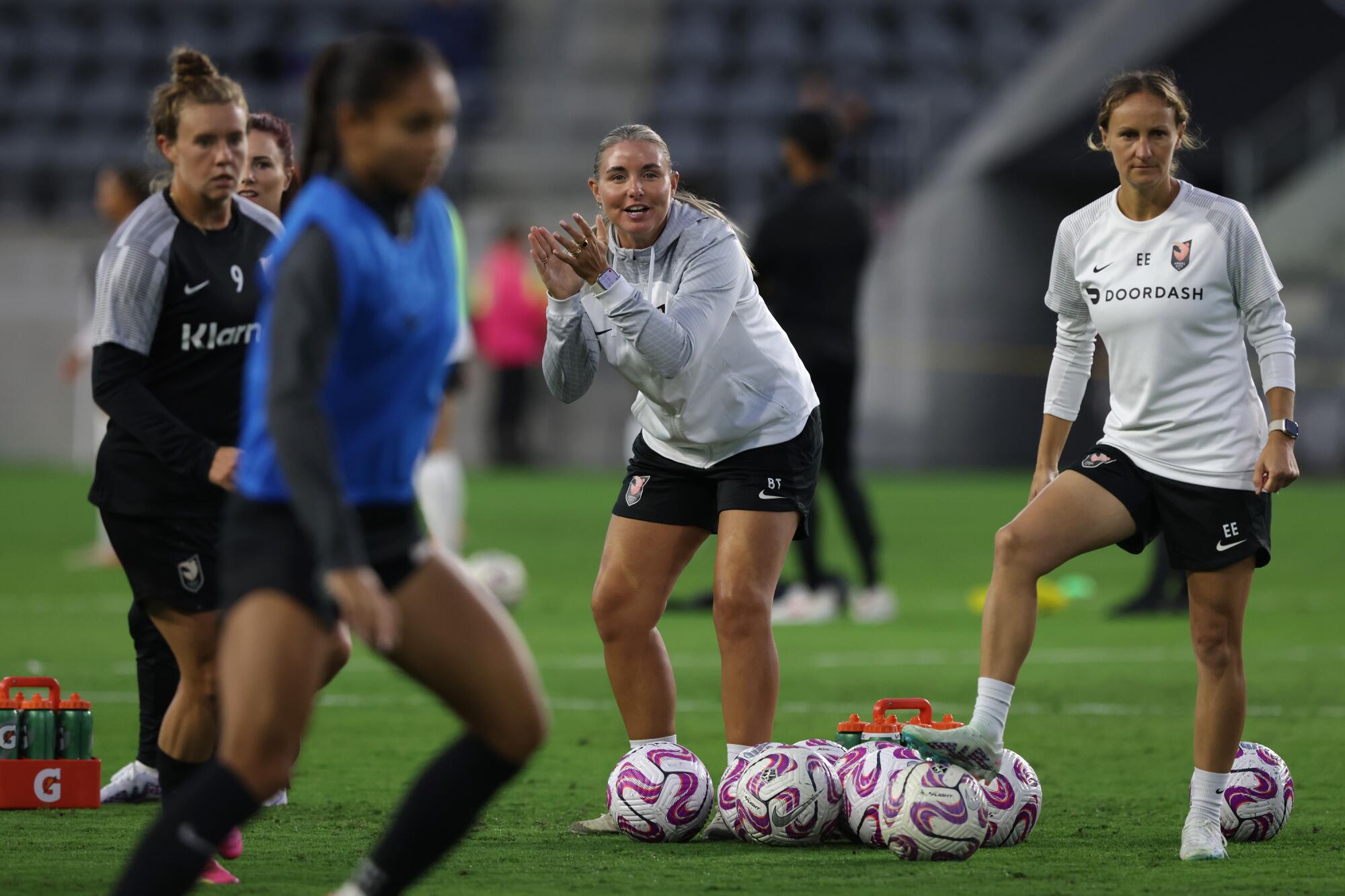
- Share via
Daniel Ball remembers the first time he knew Becki Tweed would be a great soccer manager.
The two were assistant coaches with NJ/NY Gotham when the team hit a rough patch late in the 2021 NWSL season, losing three of four games and going six matches without a win. Coach Freya Coombe, who had already been in talks to jump to Angel City, then left and with new manager Scott Parkinson’s arrival delayed by personal issues, Tweed was asked to take over on an interim basis
“She took a game and led a pregame speech,” Ball, now Angel City’s goalkeeper coach, recounted after practice Tuesday. “Carli Lloyd sat at her locker and led this raucous cheer after she finished talking. It was incredible.”
Thus inspired, Gotham ended its losing streak that day and started an eight-game unbeaten one that ended with the team reaching the playoffs for the first time in eight years.
Fast forward two years. Tweed and Ball are again assistants under Coombe, this time in Los Angeles. After losing three of four games to fall to 11th in the 12-team league, Coombe is again let go and Tweed is again named interim manager.
Angel City hasn’t lost since Becki Tweed took over as interim coach for Freya Coombe, cultivating a new vibe within a team hoping to reach the playoffs.
Angel City lost just one of its final 14 games to reach the playoffs for the first time, a tournament it opens Friday in Seattle against Megan Rapinoe and the OL Reign.
And Lloyd is again leading the cheers.
“I’m not surprised with Becki’s success,” the two-time World Cup champ said. “It is unfortunate the circumstances with how she has taken over, but she’s truly embraced it [and] gotten the players to buy into her philosophy and do the unimaginable.”
As for how she did it, that depends on who you ask.
“There’s just so many things that she brings to the table for our team,” said defender Sarah Gorden. “She knows exactly how to drive us and how to pull the right things from us. I really like playing for her for so many reasons.”
“There’s a lot of things,” agreed defender Paige Nielsen. “That Becki’s done an amazing job, I can’t do this any justice. To come into a team where you don’t pick your own players, where she doesn’t even know if she has the head coaching job?”
Tweed said the turnaround really came down to one thing: convincing everyone in the organization that they mattered.
“Every person that enters this building is important. You can’t win anything on your own,” Tweed said, sitting at a tiny wooden picnic table next to the portable building that serves as Angel City’s headquarters in a back corner of the Cal Lutheran University campus in Thousand Oaks. “You can’t rely on one, two, three players. The game doesn’t work like that. You have to rely on a group of people that all have the same goals.”
To create that, Tweed turned every training session into an audition for the next game; the starting lineup would be decided not on reputation, but on performance. For a team with a veteran roster featuring eight World Cup players, that seemed like a dicey strategy. But the buy-in was immediate.
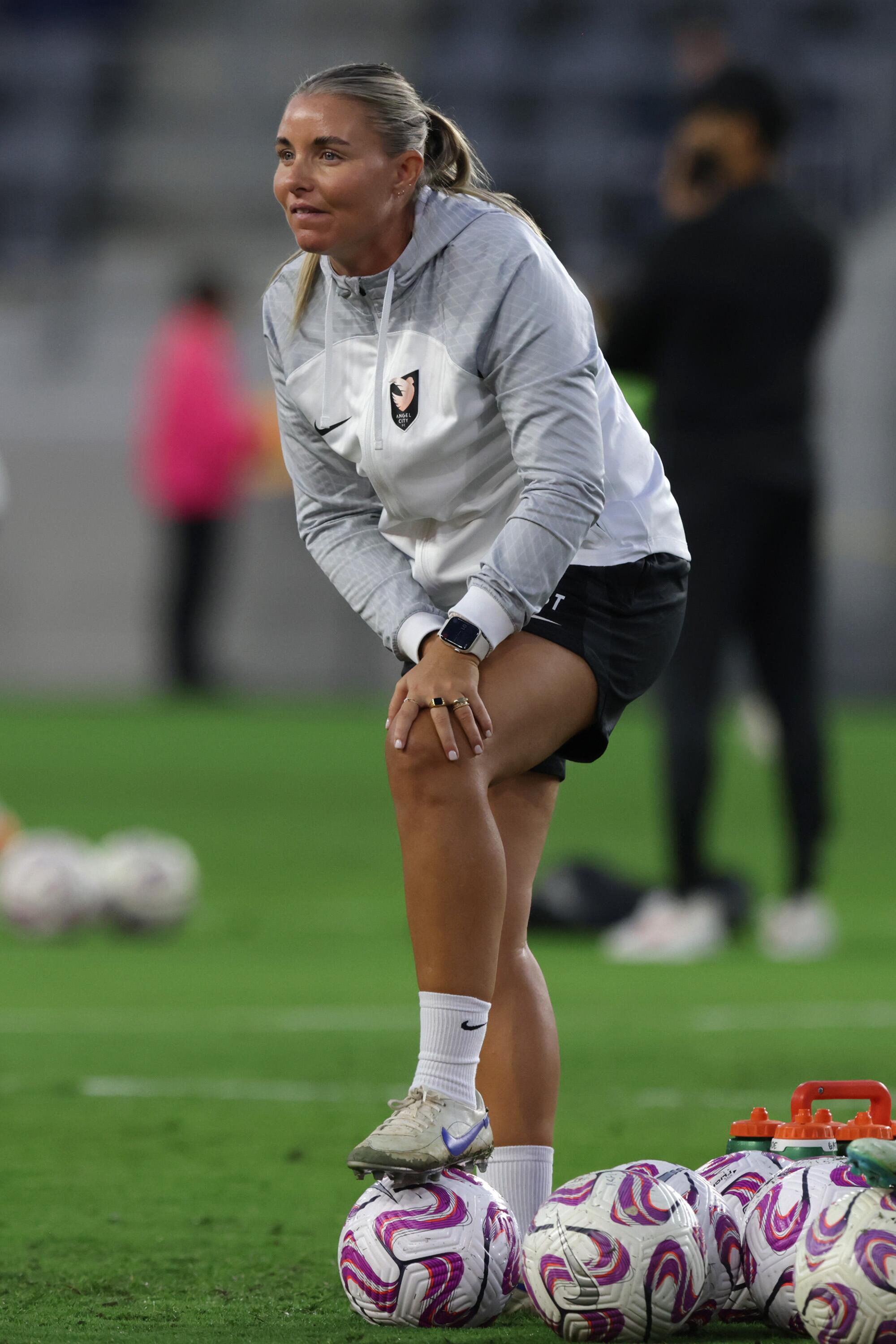
“It made it really competitive. It drew the entire group in, the best player to the worst player. Everyone had a shot at starting,” Nielsen said. “That made trainings a lot more competitive. It made us a lot more focused as a group. That translates directly to the game.”
As a result, a team that woefully underperformed under Coombe, going 11-21-10 in its first season and half, took off under Tweed, going unbeaten in its first 11 games and finishing 8-1-5 overall. It wasn’t easy — seven of the eight wins were by one goal and two games ended in scoreless draws — but the grit the team displayed in squeezing out every point paid off when Angel City clinched its playoff berth on a series of tiebreakers.
“In this league you don’t always have to be the best-performing team. You need to know how to win games,” Gorden said. “That’s something that we were lacking the first half of the season. Part of finding a way to get results is bringing the fight.”
Tweed, 34, has made a career out of bringing the fight since little has been handed to her. A native of Bristol, a port city in southwest England, she played six seasons without distinction for Bristol and Millwall in the Women’s Premier League before coming to the U.S. and finishing her career in the third-tier WPSL. She has spent the entirety of her coaching career as an assistant, starting at Monmouth University and Gotham and later joining the staff of the U-20 national team before coming to Angel City last January.
Ball knows Tweed better than anyone else on the staff, having shared an apartment with her during their year together in New Jersey. So he knows how emotionally difficult that journey has been.
Angel City needs a win and some help elsewhere to clinch its first playoff spot. Savannah McCaskill is one key reason the club has a postseason path.
“We had some tough conversations,” Ball said. “She was at this interesting space where she was trying to figure out what her role was. Becki had a fringe role, I think is fair.”
Then Becca Moros, Gotham’s top assistant, left for the University of Arizona and Tweed moved up a spot. Two months later Coombe was let go, Tweed took her place for a game “and since then,” Ball said, “she’s not really looked back.”
At Angel City, she’s changed the entire culture of the team, encouraging players and staff to approach her at any time to talk about anything. They may not always like the answers, but Tweed will always take the questions.
“She’s told us a few times this is her first time as a head coach. She’s still learning so she doesn’t come with the giant ego,” Gorden said. “She drives us, she knows how to bring the energy into the locker room. There’s just so many things that she brings to the table for our team.”
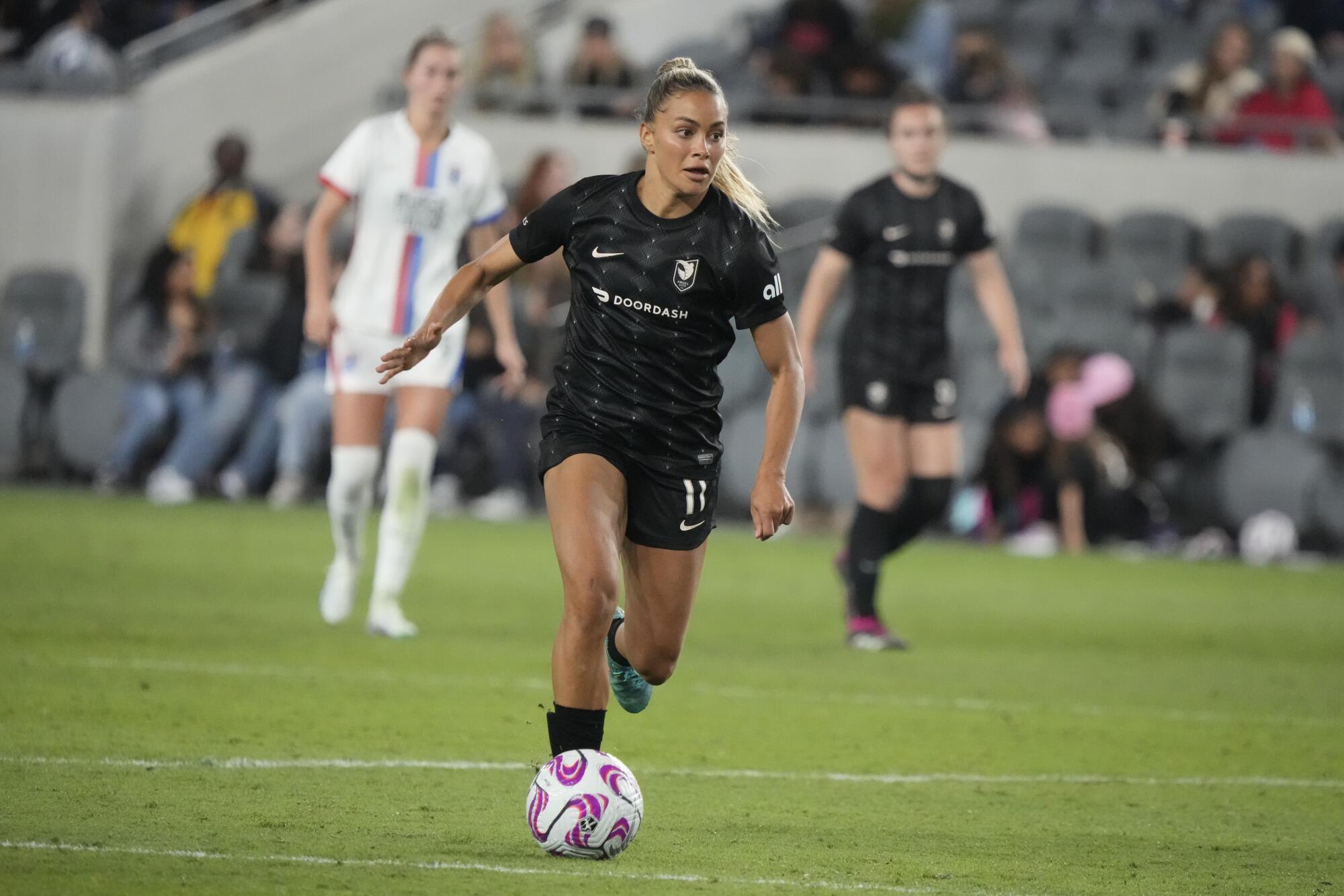
One of them is a work ethic that borders on the maniacal. That intensity is one reason why Ball kept his own apartment when Tweed came to join the team in L.A.
“She makes soccer the priority. Our women are soccer players. They want soccer to be the priority,” he said, something that wasn’t always true in Angel City’s first season when a HBO film crew was embedded with the team and the franchise’s Hollywood ownership group frequently received top billing.
“That means they become the priority of conversations, they become the priority in the film room, they become the priority on the field,” Ball said. “And ultimately the results become the priority.
“She’s provided direction, a destination that we can work toward. What you see on game days is the fruit of that.”
Yet she still hasn’t gotten the credit and respect she’s earned. When Tweed addressed the staff for the first time as the interim coach last June, Ball remembers the meeting feeling a bit weird.
“I realized that everyone sees Becki as the U-20 assistant coach. They don’t see her as Becki, who picked up Gotham,” he said. “Now I’m getting to this place where I see Becki as the head coach.”
Still that interim tag, which she wore for a week at Gotham, continues to stick to her like a jealous boyfriend despite the job she’s done over the last four months.
“It’s kind of crazy that she has done what she’s done and she’s still the interim head coach,” Gorden said.
Asked if Tweed should be named Angel’s City permanent head coach, Ball laughed.
“Yes. 100%,” he finally said. “What a stupid question. I can’t imagine a world in where our club don’t hire Becki.”
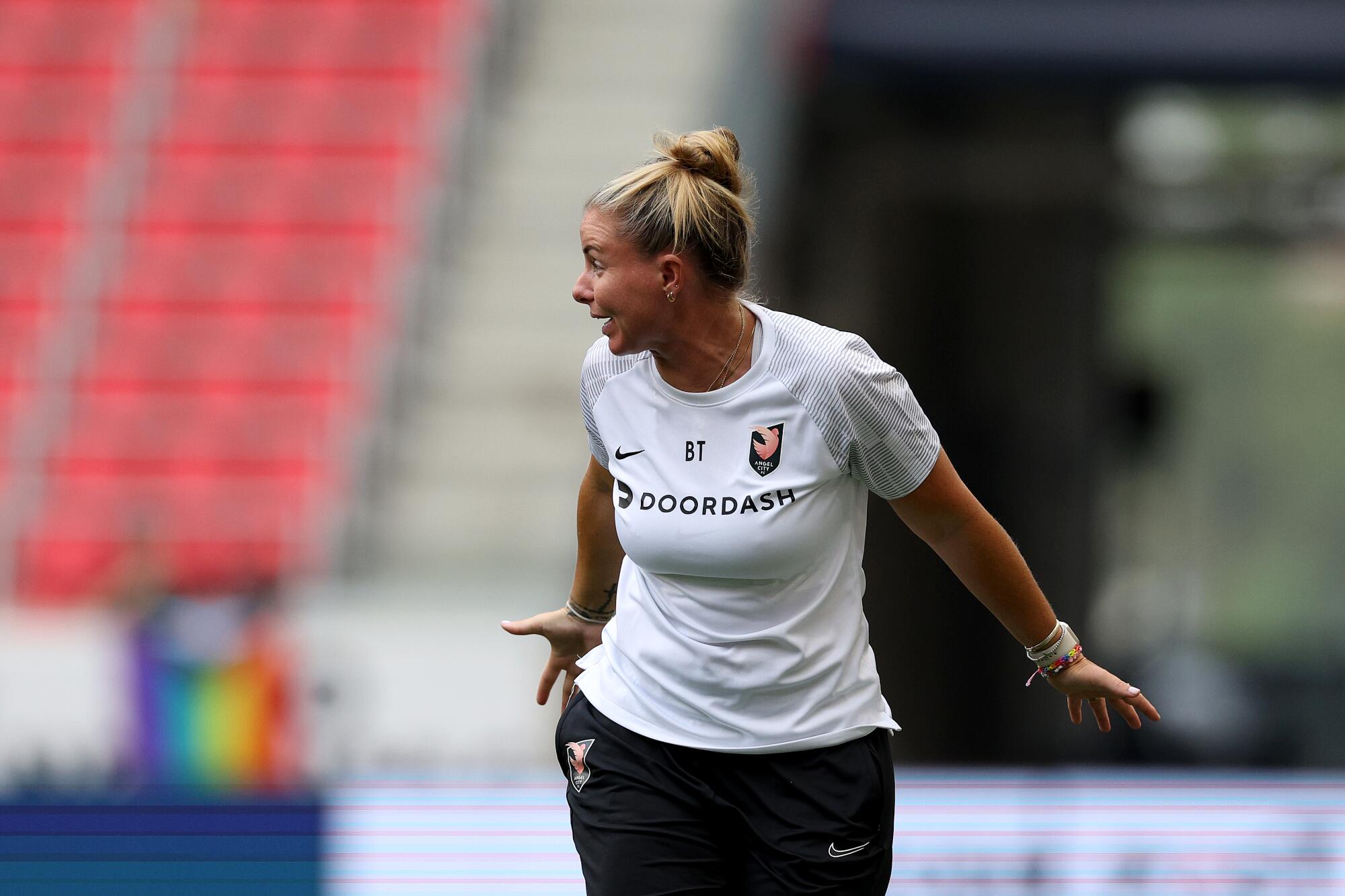
Angela Hucles Mangano, a founding Angel City investor as well as the team’s general manager, is the one who will eventually have to make that call. She said the team is required to “do a thorough search process” before naming a permanent coach, but agrees Tweed is making a strong case for herself.
“She’s doing everything the right way,” she said. “I’ve been tremendously proud and happy of the way that Becki has stepped in, from the initial conversation of, ‘Are you up for this?’ to where she’s brought the team today. It’s not just the results. The way that she has organized the team and instantly gained the respect of the players and brought this team together is tremendous by anybody’s standards.”
Tweed, who has felt overlooked for much of her coaching career, seems disappointed her future at Angel City is even up for discussion. When she took the job, management told her the goal was to reach the playoffs. She’s done that. Now that goal shifts to winning in the playoffs, starting Friday when Angel City has chance to end Rapinoe’s stellar career on the artificial turf at Lumen Stadium, where the Reign drew a league-record crowd of 34,130 in their regular-season finale.
Yet Tweed deflects whatever pain she feels with an uncomfortable smile and a string of clichés.
“You just have to go one game at a time,” she said. “The decision for the club needs to be the right person for the job. I respect that. We’ll see.”
Tweed then turned to a phrase she uses frequently to keep her players motivated.
Angel City fans have praised the team’s inclusive environment, but some fans are upset after ACFC changed flag policies because of the war in Gaza.
“If you get complacent, that’s when things can go wrong,” she said. “Making sure that people feel valued … is key.”
Feeling valued is what Tweed wants most and her success in NWSL has drawn notice in the rest of the league, where a third of the teams are without permanent managers, and in Europe — especially when people like Lloyd, a two-time world player of the year, are among the references listed on her resume.
“It’s a great platform for her to showcase herself,” Nielsen said. “A coach needs a couple of things. Either you can be motivating, you can be a tactical genius or you can be [on] the technical side. She has all three. She sees the game so well. She gives us a plan and it’s our job to execute it.
“Listen, I love Becki as a head coach. But I know that this job is lucrative. There’s movement all the time.”
Tweed got Angel City moving in the right direction. On Friday she gets another chance to see how far she and the team can go.


